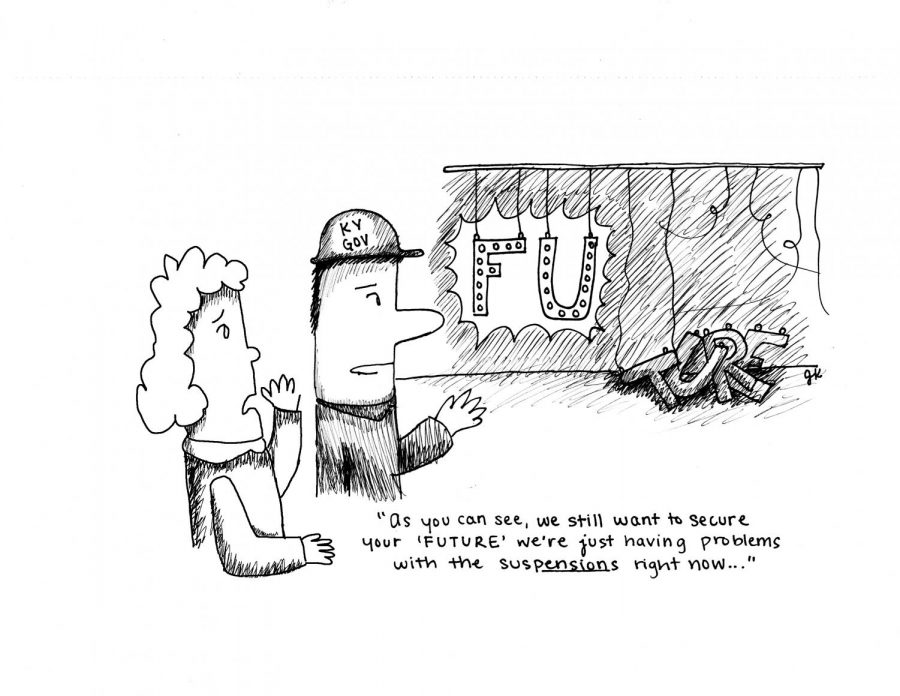Editorial: When dealing with pensions, look into hemp and gambling
September 27, 2017
EDITORIAL
The issue: The current Kentucky pension crisis was recently described as “one of the worst across the country” by Tony Glisson, director of human resources at WKU. Kentucky has over $64 billion in unfunded pension liability which equates to over $15,000 of pension liability per Kentuckian. President Timothy Caboni recently stated campus budgets may have to be cut to cover pension obligations.
Our stance: State legislators should be open to substantive, unorthodox reform that will not put public safety at risk in order to address the pension crisis. Otherwise, college students and their parents, who already are burdened with the costs of higher education, may be strained even further to help fix this issue.
The pension crisis in Kentucky is one that could negatively affect generations of families, whether they are comprised of students or soon to be retirees. This is why state lawmakers have to explore all legislative options, even the unorthodox, to ensure the most effective solution is put in place to address this long-term, complex financial issue.
President Timothy Caboni has already taken a proactive stance on this issue saying “we must recognize that some change is likely inevitable, and it is better for us to engage proactively in a conversation with policy-makers as they wrestle with these very complex issues rather than waiting for them to make their decisions.”
There are a few avenues, albeit controversial, that lawmakers could take that could generate a substantial enough amount of revenue to offset our state’s pension woes.
The first option is the legalization of hemp. According to the Kentucky Department of Agriculture, the United States is the only industrialized nation that does not allow hemp production for commercial purposes. Kentucky is currently at the forefront of this industry as one of eleven states who have legalized the research of hemp.
Kentucky, once a leader in hemp farming, was heavily affected by the 1938 Controlled Substances Act which outlawed hemp, along with marijuana.
Much of the opposition to the legalization of hemp is due to its striking chemical similarity to marijuana. This idea has been criticized by Kentucky State Police, the argument being that law enforcement would be unable to tell hemp and marijuana apart.
Despite its chemical similarity to marijuana, hemp is not a psychoactive drug, meaning it cannot be used recreationally to get high. Even Republican senators Rand Paul and Mitch McConnell have taken progressive steps in this issue by introducing the Industrial Hemp Farming Act in 2013. This legislation would remove hemp from the federal list of controlled substances.
Hemp, which is used in many common products such as rope, shampoo and auto parts, is one option Kentucky lawmakers should keep in mind that could help address the pension crisis.
Another option is the legalization of casino gambling in Kentucky. Governor Matt Bevin has already made his stance on this issue clear saying that he didn’t think the benefits of legalizing expanded gambling would offset “the societal costs.”
One can argue that people who are currently involved in gambling are not going to be deterred by having to drive a little farther to gamble outside of the state. If people are going to gamble, why shouldn’t Kentucky profit from it and help the people who are going to be negatively affected by the financial cuts that will have to be made to offset this unsustainable pension system?
Simply hoping that the pension crisis will disappear is the same as doing nothing to fix it. It won’t be a quick fix and tough cuts will still likely have to be made. However, if Kentucky is serious about tackling the time-sensitive issue of the state pension system, options like legalizing the production of industrial hemp and casino gambling need to be explored further.














![Students cheer for Senator at Large Jaden Marshall after being announced as the Intercultural Student Engagement Center Senator for the 24th Senate on Wednesday, April 17 in the Senate Chamber in DSU. Ive done everything in my power, Ive said it 100 times, to be for the students, Marshall said. So, not only to win, but to hear that reaction for me by the other students is just something that shows people actually care about me [and] really support me.](https://wkuherald.com/wp-content/uploads/2024/04/jadenmarshall-1200x844.jpg)










